Derek Li, 32, a medical doctor, is one of Singapore’s top marathon runners.
Some of Derek’s achievements in marathon running include a personal best (PB) timing of 2 hours and 42 minutes, which was set at the Boston Marathon earlier this year, and a credible sixth placing in the 2013 Standard Chartered Marathon Singapore.
Derek also regularly trains together with Mok Ying Ren, the South-East Asian Games Marathon Gold Medallist.
For the Safra Bay Run and Army Half Marathon (AHM), which takes place this Sunday, on 31 August, Derek shared some last-minute tips on running and training with participants – at a tapering session organised by Singaporean running club, the Running Department.
Here are the main highlights that Derek shared with the participants at the training session. This was done in a Question and Answer (Q&A) session, with the participants asking the doctor questions.
What tips do you have for runners who are competing in the Safra Bay Run and Army Half Marathon this year?
Get enough sleep
The first tip is to get enough sleep. AHM has a flag-off time at 5am for the 21Km race, so you have to get up at 3.30am or even earlier. Try to get enough sleep on Thursday and Friday. On Saturday it may be difficult because of the race.
Try and bring forward your sleeping time. For example, if you normally sleep at 11PM, try and sleep at 10.30PM on Thursday night and 10.00PM on Friday. Also, try and get at least eight hours of sleep on Thursday and Friday, so that if you only manage three or four hours on Saturday, it is not so bad.
Do not train too much in the last week
Another tip is to not to do too much training in the last week. For any type of interval training, the benefit is only there eight to ten days later. So now you should just do easy runs.
There is no point in doing intervals already. Generally, the coaches estimate that your benefit from any single run is that you will gain a maximum of 1% of extra fitness. So it is always best to err on the side of caution. If you do three hard runs, you will gain 3% of additional fitness but at the same time, you may not recover in time and it will mess up your entire race.
So try and just forget about gaining that 1% of additional fitness and just make sure you rest enough in the days leading up to the race. That will help to ensure that at least you will hit 90 to 95% of your potential on race-day.
The last 1% of your race-day potential is very hard to predict because of factors such as traffic congestion on the course that you can’t really control.
Tapering
You do not actually need to taper so early if you are running less than 50Km to 60Km a week. Generally, for those doing less than 50Km a week total volume, you will only need 5-6 days of tapering. If you are running about 60-100Km a week, you will need one week of tapering and if you are doing more than 100Km in one week, then two weeks of tapering are needed.
The aim of tapering runs is to reduce the volume and maintain the intensity. I personally find that doing tapering runs at too high an intensity is dangerous because you run the risk of doing too many hard intervals.
Generally, I think for half marathon training or full marathon training, the main interval training is done at half or full marathon pace. If you talk to professional runners, they are doing 2Km to 3Km intervals and not 400m, 800m or 1Km intervals. And they do for example, five reps x 3Km intervals, or something like that. So the pace for them is very aerobic, you are talking about a heart rate of high zone 3 (maintaining 70 to 80 per cent of the maximum heart rate) and low zone 4 (maintaining 80 to 90 per cent of your maximum heart rate).
So the types of intervals the professionals do, actually don’t take that much out of you, for short periods of time. If you are doing the type of intervals that the professionals do and you cut your volume by 50%, this means that you are doing one or two reps of 3Km instead of five reps of 3Km intervals. That is still ok because it is not too taxing on the body. But if you are supposed to be tapering and you are still doing one-minute and two-minute intervals – then that is not such a good idea. You want to make sure that your legs are fresh.
During the taper, the aim of the runs is to stimulate the blood flow in the legs so that you get as much of the muscle recovery as possible. But when you are doing normal peak training, you break down a lot of muscle and most of it does not completely repair itself because the recovery time is less. So the aim is to maximise recovery time and also eat a bit better so that all of the muscle gets repaired and you will feel much better during the race.
Do you eat in the morning before you run?
Generally I do not. I get stitches easily so for morning training runs, I wake up an hour before for training runs. For races, my waking –up time will be more than an hour earlier. I just get a glass of juice and lots of water but I don’t eat. Personally, I don’t think that not eating before you start running makes a whole lot of difference unless you are going for a really long run, like more than two hours.
For longer runs, you may take something a little more substantial before you start, but I have never noticed a significant drop in my energy levels.
When and for how long should you rest during interval sessions?
Generally the faster the intervals, the longer the rest periods should be, and the interval should be based on pace. If it is at 5Km pace of faster, you are talking about a å1:1 ratio kind of rest and walk around during your rest period. Your legs will be heavy by the end of the third or fourth rep of the interval.
But if you are doing a 10Km to 15Km kind of pace, then you can do some light jogging or even jog at 50% pace. Your rest period will depend on how long your intervals are. Probably, the rest should be 1/3 of the length of the interval time, for example, if your intervals are 3 minutes, you should rest for 1 minute.
For longer intervals, like 10-minute ones, rest for two to three minutes in between.
What is your personal best in the marathon, anyway?
It is 2 hours and 42 minutes and was set at the Boston Marathon in April this year.
To complete the race in a timing of 2 hours and 42 minutes, do you run at a constant speed?
Ideally, you should. But for the Boston Marathon, it is net downhill up to 25Km and uphill up to 33Km and then even after that. So I had to take that into account. I aimed for 2 minutes positive splits but in reality, my splits were all over the place! Some were as low as 3:30 minutes per kilometre but some as much as 4:15 minutes per kilometre.
Generally when I race longer distance, it is quite easy to go by feel. When I am starting to feel breathless, I try to back off immediately because it is a long race. You don’t take risks before 33Km or 34Km. But otherwise, even splits or negative splits will be better.
If you look at the pros, even for world record pace, they try and run negative splits for 30 seconds to 1 minute. You cannot do negative splits too much though, because you won’t really be able to make up the time. If you try and do even splits throughout the race, you may fade a little bit at the end and it is not too bad. Running positive splits are very painful and you will not enjoy the second half of the race, so don’t try that.
How did you feel when you ran your personal best at the Boston Marathon? Did you feel like you were going to die at any point during the run?
I had certain goals in mind during the race. My PB going into the race was 2:47 and my aim was to go under 2:45. Ashley (Liew) did 2:44 in this race the previous year (2013) so I wanted to beat that timing. By 37Km to 38Km, I knew I was roughly there. But there was one kilometre at 40Km where there was a steep tunnel that is steeper than what I am used to in Singapore. Boston is very hilly so the first 25Km downhill already makes your legs feel smashed.
I felt quite happy during this race, but the last 2Km I slowed down a bit. The average pace for the race was 3:50 minutes per kilometre but my last two kilometres was 4:10 minutes per kilometre. So I slowed down quite a bit.
Other Blog Posts
Safra Bay Run and AHM 2013 Review
Run For Cover Singapore: Pounding the Treadmill for 24 Hours for Charity

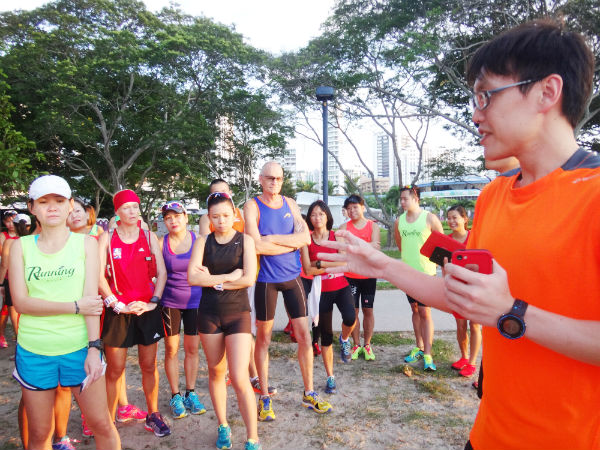
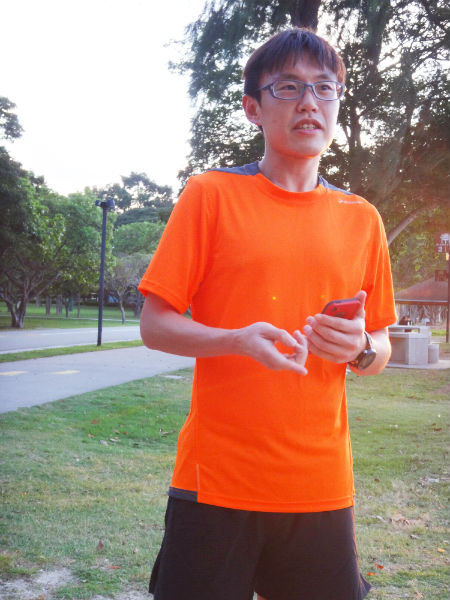

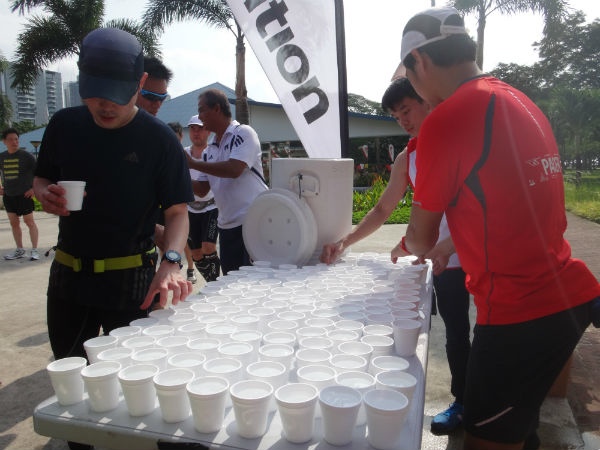
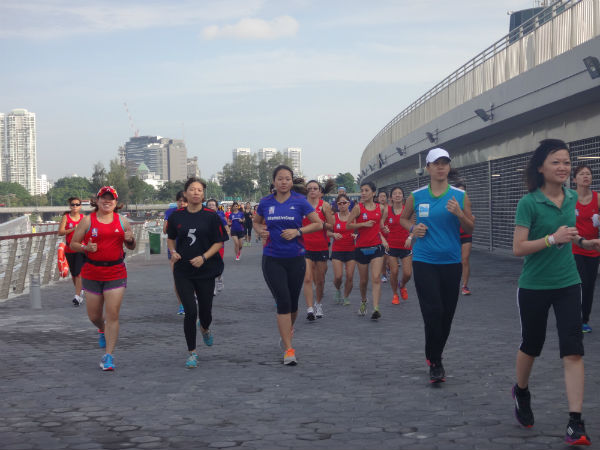
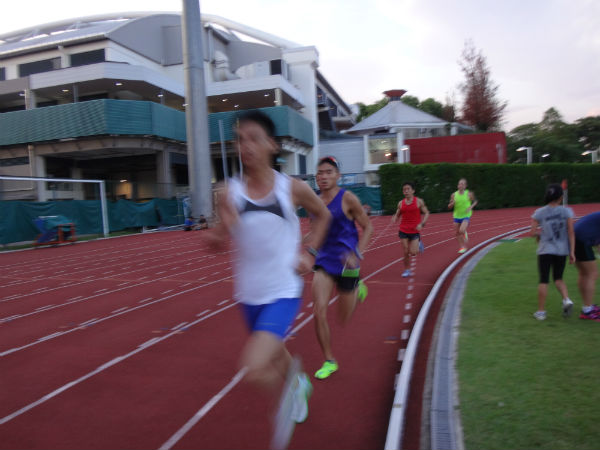
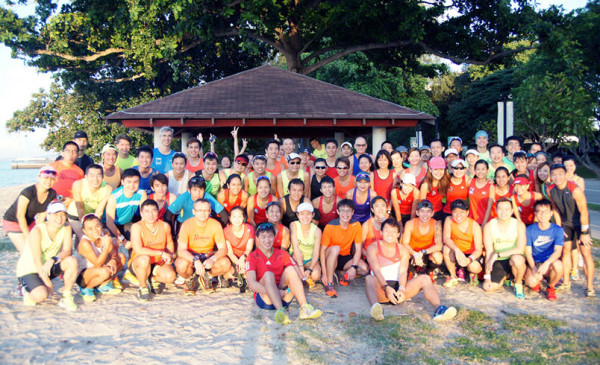
Thanks for the sharing Pris. Pacing is imperative. To me, achieving a PB is a question mark now unless i am at the first wave,